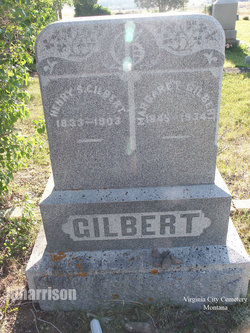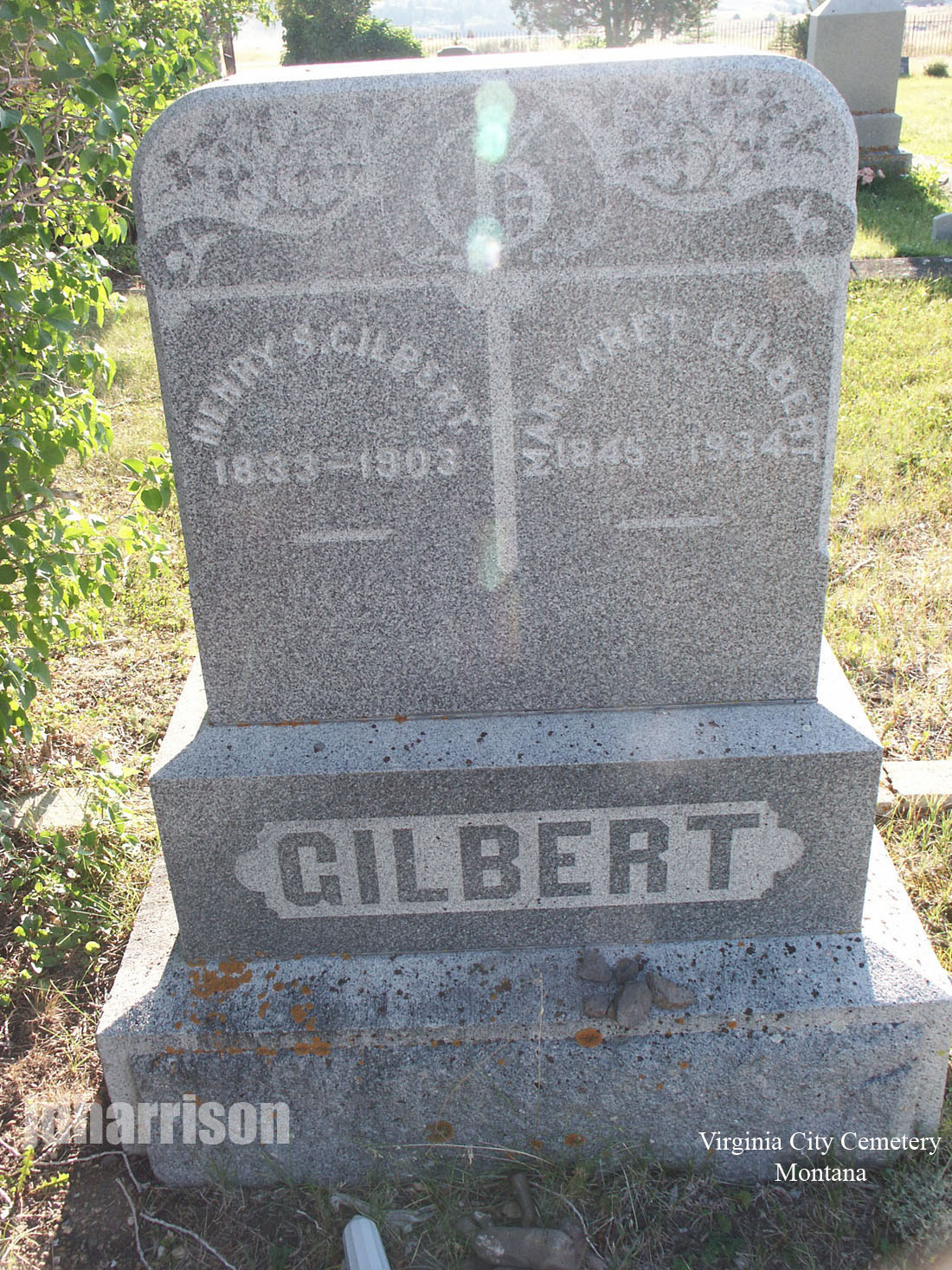Was Killed In A Runaway. Henry Gilbert, of Virginia City, Mont., Is Dead
Butte, Mont., Nov. 6--A special to the Miner from Virginia City says Henry Gilbert, one of the oldest citizens from this section of the country and a pioneer of Montana, was killed in a runaway accident last night. His horses became frightened and Gilbert was thrown from his wagon, striking on a rock by the roadside. Gilbert was 69 years of age and was county treasurer and a prominent Mason. He was born in Pennsylvania.
'Progressive Men of Montana,' 1901, A. W. Bowen & Co., page 174-5 (edited):
Henry S. Gilbert is a native of the Keystone state, having been born in Berks County on December 31, 1833, the son of Henry and Lydia (Spang) Gilbert, both of whom were born in Pennsylvania, where the father operated a gristmill and a woolen factory. The great-grandfather, Mr. Gilbert, emigrated from England to America in 1750, and his son, grandfather of Henry S., born in Pennsylvania, was a soldier in the war of the Revolution. Mr. Spang, the maternal grandfather of Mr. Gilbert, belonged to a prominent family of Berks county and his father was a soldier of the Revolution, in which it was his good fortune to save the life of Gen. Nippenburg, whom he accompanied to Germany after the declaration of peace.
Henry S. Gilbert supplemented the discipline he received in private schools in the academy at Boyertown, Pa., and engaged in teaching for a time and then learned the saddler's trade. He purchased the business of his employer and continued it for two years, when, in 1854, he removed to Lafayette, Ind., and worked at his trade in that state for six months, and then he continued westward to Lawrence, Kan., where he engaged in contracting and building, taking contracts from the New England Aid Society. He also took up government land near Manhattan, Kan., with the intention of engaging in agriculture, but in 1855 removed to Missouri, where he followed his trade until September, when he started for the Rocky mountains. Upon reaching Fort Laramie, Wyo., he engaged in trading with the Crow and Sioux Indians, and also furnished supplies to emigrants. In the spring of 1858 he was sent to overtake Gen. Johnson's command, then pushing forward against the Mormons, and to supply the soldiers with rations. Mr. Gilbert found it inexpedient to do this, and stopped at South pass, where he established a trading post and general store and for two years traded with the Snake Indians. Their chief, Washakie, who was half Flathead and half Snake, was a great friend of Mr. Gilbert and gave him many tokens of his esteem. In 1859 Mr. Gilbert sold his store and established a trading post at the foot of the Rocky Ridge, in Wyoming, where he built the first wooden house erected there. He traded with the Indians on Wind River until the fall of 1860, when he removed to Fort Bridger, and soon after established a store for Indian trade at Millersville.
On November 20, 1860, Mr. Gilbert was married at Millersville, Utah, to Miss Margaret McMinn, of Salt Lake City. She was born in Nova Scotia, whence she accompanied her parents to Utah. They were converts of the church of Latter Day Saints, but none of their children embraced the Mormon faith. After his marriage Mr. Gilbert located on a ranch south of Fort Bridger, and soon after he completed a dwelling on the place. In the spring of 1862 there was an uprising of the Ute Indians, and, as they stole the horses and stock of the settlers and menaced their safety, Mr. Gilbert was compelled to abandon the ranch and return with his wife and their child to Fort Bridger. There he entered the employ of the government, putting in a bridge at Ham's Fork, and later became associated with Judge Carter in a contract to furnish hay for the military posts, and to supply beef to the troops, and he was thus engaged until the spring of 1863. On August 12th he started for Virginia City, Mont., where he arrived on September 1, 1863, and engaged in mining.
Mr. Gilbert purchased two placer claims in Alder Gulch, but these proved unprofitable, and he then erected the brewery at Virginia City, which is now the oldest in the state. He has kept the equipment of the plant to the highest standard, has made improvements and additions as demanded, and brews a superior product, which finds a ready local sale and also commands a large trade in the territory around Virginia City. In 1880 he was elected county treasurer and held that responsible office for eleven years. He was assessor of Madison County in 1871, mayor of Virginia City for two terms and an alderman for six terms. Fraternally he is identified with Virginia City Lodge No. 1, A. F. & A. M., of which he is past master. To Mr. and Mrs. Gilbert fifteen children have been born. All are living in Madison County, seven being married and established in homes of their own.
Contributor: RunninonMT (49509864)
Was Killed In A Runaway. Henry Gilbert, of Virginia City, Mont., Is Dead
Butte, Mont., Nov. 6--A special to the Miner from Virginia City says Henry Gilbert, one of the oldest citizens from this section of the country and a pioneer of Montana, was killed in a runaway accident last night. His horses became frightened and Gilbert was thrown from his wagon, striking on a rock by the roadside. Gilbert was 69 years of age and was county treasurer and a prominent Mason. He was born in Pennsylvania.
'Progressive Men of Montana,' 1901, A. W. Bowen & Co., page 174-5 (edited):
Henry S. Gilbert is a native of the Keystone state, having been born in Berks County on December 31, 1833, the son of Henry and Lydia (Spang) Gilbert, both of whom were born in Pennsylvania, where the father operated a gristmill and a woolen factory. The great-grandfather, Mr. Gilbert, emigrated from England to America in 1750, and his son, grandfather of Henry S., born in Pennsylvania, was a soldier in the war of the Revolution. Mr. Spang, the maternal grandfather of Mr. Gilbert, belonged to a prominent family of Berks county and his father was a soldier of the Revolution, in which it was his good fortune to save the life of Gen. Nippenburg, whom he accompanied to Germany after the declaration of peace.
Henry S. Gilbert supplemented the discipline he received in private schools in the academy at Boyertown, Pa., and engaged in teaching for a time and then learned the saddler's trade. He purchased the business of his employer and continued it for two years, when, in 1854, he removed to Lafayette, Ind., and worked at his trade in that state for six months, and then he continued westward to Lawrence, Kan., where he engaged in contracting and building, taking contracts from the New England Aid Society. He also took up government land near Manhattan, Kan., with the intention of engaging in agriculture, but in 1855 removed to Missouri, where he followed his trade until September, when he started for the Rocky mountains. Upon reaching Fort Laramie, Wyo., he engaged in trading with the Crow and Sioux Indians, and also furnished supplies to emigrants. In the spring of 1858 he was sent to overtake Gen. Johnson's command, then pushing forward against the Mormons, and to supply the soldiers with rations. Mr. Gilbert found it inexpedient to do this, and stopped at South pass, where he established a trading post and general store and for two years traded with the Snake Indians. Their chief, Washakie, who was half Flathead and half Snake, was a great friend of Mr. Gilbert and gave him many tokens of his esteem. In 1859 Mr. Gilbert sold his store and established a trading post at the foot of the Rocky Ridge, in Wyoming, where he built the first wooden house erected there. He traded with the Indians on Wind River until the fall of 1860, when he removed to Fort Bridger, and soon after established a store for Indian trade at Millersville.
On November 20, 1860, Mr. Gilbert was married at Millersville, Utah, to Miss Margaret McMinn, of Salt Lake City. She was born in Nova Scotia, whence she accompanied her parents to Utah. They were converts of the church of Latter Day Saints, but none of their children embraced the Mormon faith. After his marriage Mr. Gilbert located on a ranch south of Fort Bridger, and soon after he completed a dwelling on the place. In the spring of 1862 there was an uprising of the Ute Indians, and, as they stole the horses and stock of the settlers and menaced their safety, Mr. Gilbert was compelled to abandon the ranch and return with his wife and their child to Fort Bridger. There he entered the employ of the government, putting in a bridge at Ham's Fork, and later became associated with Judge Carter in a contract to furnish hay for the military posts, and to supply beef to the troops, and he was thus engaged until the spring of 1863. On August 12th he started for Virginia City, Mont., where he arrived on September 1, 1863, and engaged in mining.
Mr. Gilbert purchased two placer claims in Alder Gulch, but these proved unprofitable, and he then erected the brewery at Virginia City, which is now the oldest in the state. He has kept the equipment of the plant to the highest standard, has made improvements and additions as demanded, and brews a superior product, which finds a ready local sale and also commands a large trade in the territory around Virginia City. In 1880 he was elected county treasurer and held that responsible office for eleven years. He was assessor of Madison County in 1871, mayor of Virginia City for two terms and an alderman for six terms. Fraternally he is identified with Virginia City Lodge No. 1, A. F. & A. M., of which he is past master. To Mr. and Mrs. Gilbert fifteen children have been born. All are living in Madison County, seven being married and established in homes of their own.
Contributor: RunninonMT (49509864)
Family Members
-
![]()
Frances Emma Gilbert Albright
1861–1949
-
William H. Gilbert
1863–1934
-
![]()
Margaret Gilbert Reid
1865–1950
-
![]()
Clara Gilbert Foster
1866–1935
-
![]()
Amelia Gilbert Trout
1866–1946
-
![]()
Walter Gilbert
1870–1892
-
![]()
Cora Mary Gilbert
1872–1944
-
![]()
Sarah Gilbert Powell
1874–1935
-
![]()
Valentine Gilbert
1878–1947
-
![]()
Lewis O Gilbert
1886–1961
Sponsored by Ancestry
Advertisement
Advertisement





















